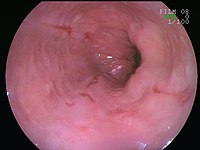
Photo from wikipedia
Editor We thank Bonavina et al. for their correspondence. We are delighted they agree that a well-designed and conducted RCT to compare the effectiveness of magnetic sphincter augmentation (MSA) and… Click to show full abstract
Editor We thank Bonavina et al. for their correspondence. We are delighted they agree that a well-designed and conducted RCT to compare the effectiveness of magnetic sphincter augmentation (MSA) and anti-reflux surgery is required to inform clinical decision-making We note that they cite a meta-analysis of non-randomized studies, an optional registry and an RCT as evidence supporting the safety and effectiveness of MSA. The conduct of meta-analyses using non-randomized data is subject to the risk of confounding by measured and unmeasured factors. None of the included studies were assessed for ‘quality’ and there were some differences in patient characteristics (e.g. higher BMI and larger hiatus hernia in the fundoplication groups). The studies did not all report on the same outcomes, including adverse events such as erosion or explantation, and follow-up was sometimes limited. Although the registry paper included 1000 patients, median follow-up was just 274 days and it is uncertain if all patients undergoing MSA were included and reported. The RCT, in which all authors were sponsored by the device manufacturer Torax Medical (North Shoreview, Minnesota, USA), included 152 patients (of whom 50 underwent MSA) and claims efficacy of MSA over proton pump inhibitors (PPIs) using a primary outcome of ‘moderate to severe regurgitation’ at 6 months. Compliance to PPI treatment (which was at a lower dose than that used in clinical practice) was not measured and the risk of bias was unclear due to a lack of information about allocation concealment, blinding of assessors, and there was differential attrition between groups. The authors concluded that the device was safe, despite 32 per cent of MSA patients reporting dysphagia, and although no devices were explanted, follow-up was just 6 months. We therefore do not feel that this evidence supports the safety and effectiveness of MSA as claimed. Our review of the published literature regarding MSA took a novel approach. We undertook a detailed analysis over time of reporting of study design, clinical indications, technique standardization, governance arrangements and outcome selection, as an evaluation of how the innovative procedure progressed. We hoped to see the acquisition of incremental evidence. However, we identified deviations from Food and Drug Administration eligibility criteria, heterogeneity of outcome reporting, and limited and inconsistent technique descriptions. This means it is difficult to decide how to select patients and replicate the procedure in future studies and clinical practice. Thus, we continue to believe that our conclusion that ‘there is a need for robust assessment and reporting to improve the rigour with which innovative surgical procedures are evaluated, to optimize transparency, maximize patient benefit and reduce harms’ is justified. We hope that swift and scientific evaluations of MSA will now take place.
Journal Title: British Journal of Surgery
Year Published: 2020
Link to full text (if available)
Share on Social Media: Sign Up to like & get
recommendations!